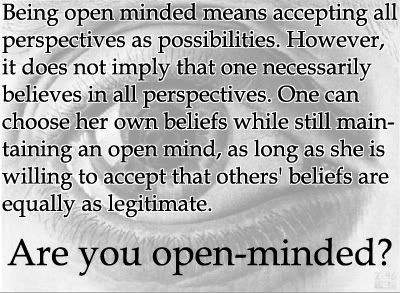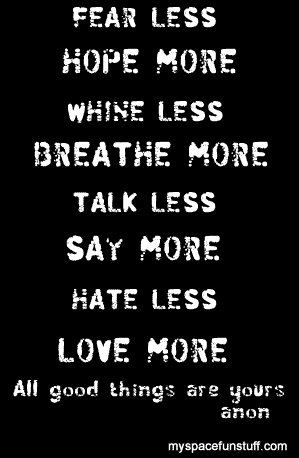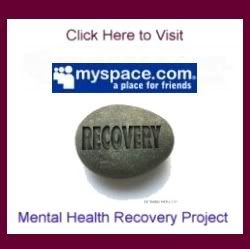The following comments were made by my friend Steve on the MHRP website:
- "It's funny how some of the people in these Myspace mental health groups like to play doctor and diagnose a person as manic or whatever."
- "I know a lot of people who accused me of being manic when I started disagreeing with psychiatry...The idea that people who don't believe they're mentally ill is an indication that their judgment is impaired is bullshit."
- Dr. GlenMullen, M.D. (states that) scientists haven't proved a chemical imbalance exists in a mentally ill person's brain, and that they don't know how medication works.
- "Medication can be helpful sometimes, but I'm getting the sense that it's tremendously overprescribed."
I was inspired by these comments and felt compelled to write about them. Why?
Because Steve is the picture of Recovery!!
Being a mental health counselor, I wish more of my clients thought this way. But before you agree or disagree, I'd like to break down some of Steve's comments to explain my thought-process...
- "...people in these Myspace mental health groups like to play doctor and diagnose..."
- "The idea that people who don't believe they're mentally ill is an indication that their judgment is impaired is bullshit."
I've been guilty of this. As soon as I became "educated" on mental health issues, I was eager to start using it. I couldn't have a brief conversation with a store cashier without thinking: "She's depressed." And I'm still trying to figure out what kind of personality disorder my ex-husband has (heh-heh!)
I don't think this is unusual. As soon as we learn something new, we want to use it. Why learn how to cook then continue to hit the McDonald's drive-thru? But after awhile, I had to force myself to stop diagnosing people, including my clients.
Labelling people creates negative energy, and by holding mental pictures of a person's pathology not only brought my own mood down, but also prevented me from hearing what my clients were really saying.
I'm not perfect - I still slip into "diagnosis mode." This is why I like Steve's comments because he understands that the "people in these mental health groups" are not necessarily right. True recovery involves standing up for yourself, even when "The Experts" tell you you're wrong.
- "...(people) accused me of being manic when I started disagreeing with psychiatry."
It is human nature to try to understand what you don't understand. In other words, people with mental health issues are "different," and mainstream society hates that. People who deviate from the norm are threats - not necessarily to society as a whole, but to our own psyche. If the seemingly-put-together woman who has "everything" suddenly loses it and ends up in therapy and on medication, we get scared. Could that happen to me? And then, How can I prevent that from happening to me?
That's how psychiatry was born - as a way to "fix" the "different" people so they don't intimidate our own insecurities. But human behavior is so complex and unique that it can't possibly be explained with blanket-theories and treated with one-size-fits-all medications.
Again, We-The-Experts have studied this stuff for a long time (and have the student loan payments to prove it - heh-heh!) We're convinced we "understand" people's "problems," sometimes more-so than the people themselves. So when someone disagrees with our "knowledge," we don't like that.
Is this ego? Sure, everyone has an ego. But also, most people who work in the mental health field are good people - i.e., they care. I've personally witnessed clients in crisis, and it wasn't pretty.
When you've seen people with rope-burns on their neck or charcoal on their lips after having their stomach pumped, you want to make sure that never happens again. But when you become a zealot about it, you tend to shoot-down people like Steve who are just sharing theirs opinions.
Calling someone "manic" just because he says something is bad practice. Now, if he robbed a bank and spent all the money on gumballs and hair gel...well, then yeah, he's manic.
- "Dr. GlenMullen, M.D. (states) that scientists haven't proved a chemical imbalance exists...and that they don't know how medication works."
- "Medication can be helpful sometimes, but I'm getting the sense that it's tremendously overprescribed."
So what do you do with the manic gumball-and-hair-gel-lovin' bank robber? You give him medication. I don't dispute that for a single minute. Steve is right - scientists don't know how medication works, but it does work. Which leads to Steve's second point about over-prescribed meds.
Psych meds are a complex issue with many players involved. First, human beings don't like to feel crappy, so when they find something that helps them feel better, they use it (coffee, anyone?)
As a result, some people rely solely on meds to solve their problems. In fact, I once had a client ask me if the doctor could prescribe an "anger pill." Translation: I don't want the natural emotion of anger and I don't want to take Anger Management classes.
Drug companies confuse the issue. I can't watch a T.V. commercial for an anti-depressant without rolling my eyes. They paint this wonderful picture that if you take a med, you'll be transformed from a depressed lump to an active, happy camper.
And why wouldn't they? A single pill only costs a couple cents to manufacture, but can be sold for a couple bucks apiece. Now that's a helluva profit! So if they can run a commercial to convince you it'll work (cuz it likely will), it's a win-win: they get rich, you feel better.
This puts psychiatrists in a tough bind. They know meds work. And if someone with a history of aggressive behavior asks for an "anger pill," it can be hard to say no. After all, if this client ends up shooting 10 people in a Burger King, eventually someone will ask the psychiatrist why he/she didn't help.
Again, this can lead to zealousness. When you know something is helpful, it's hard not to make it available. Dr. Peter D. Kramer's book Listening to Prozac does a good job at explaining why some psychiatrists get happy with the prescription pad.
On the other hand, I've worked with psychiatrists who refused to give meds based on a client's random symptoms and requests. Instead, they suggest other methods (therapy, self-help, stress-management, lifestyle changes, etc.) Unfortunately, they'll tell you that most clients don't want to hear this...but some do. Steve is part of these "some." His comments show that he is willing to try more than just meds...and that's the attitude you need to recover.
In short, Steve's comments are an example of someone working a recovery plan. Recovery is about finding what works for you, then being willing to do the work. This requires:
- A sense of personal responsibility. Take what's yours and own it. If you have a pet, it's your responsibility to take care of it. And if you have a mental health issue, it's your responsibility to take care of it. In both cases, if you don't take care of your responsibilities, someone else will step in and take care of it for you. Don't give your power away.
- An open-mind. Be willing to try something to see if it works before completely rejecting it. If you try something a couple times and get no benefit from it, then you'll be able to move on to something else. This type of effort sends a message to "The Experts" that you're in control, which will get them off your back.
- An ability to look in the "gray area" between pro-psychiatry and anti-psychiatry. If you embrace psychiatry completely, you'll be at the mercy of the mental health system. If you reject psychiatry completely, you'll be eating all your gumballs in a hospital gown.
- Self-respect. You have to love yourself enough to do what you need to do to take care of yourself, and reject what's hurting you.
- A positive mind-set. A lot of people think this means "thinking happy," which it isn't. Instead, it means favorably viewing yourself, others, and the world. If you think you're a loser, that "The Experts" are against you, and the world is a horrible place, you're not going to recover.
- Balance. Be aware that everything and everybody has good and bad points. Embrace your strengths, understand that "The Experts" are mainly good people, and that there's more kindness in the world than hate.
Yes, it's good to know the "bad" so you can avoid it. But make sure to give equal attention to the "good," because it's out there.
Your behavior responds to your thoughts. Awareness of BOTH good and bad will help you feel more balanced...and balance is the cornerstone of recovery.








